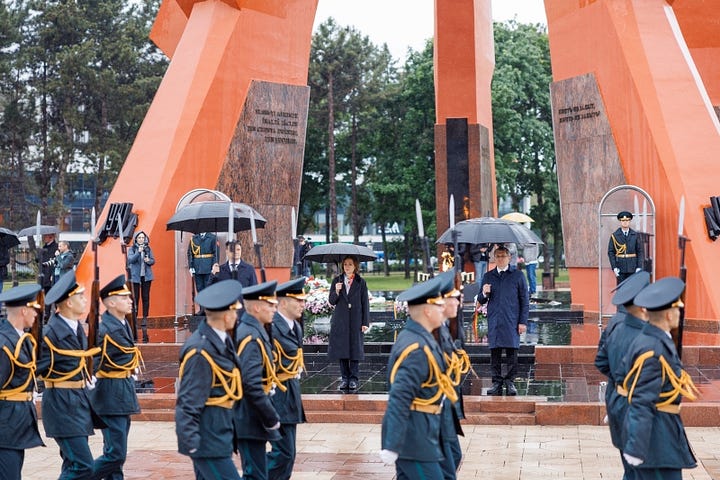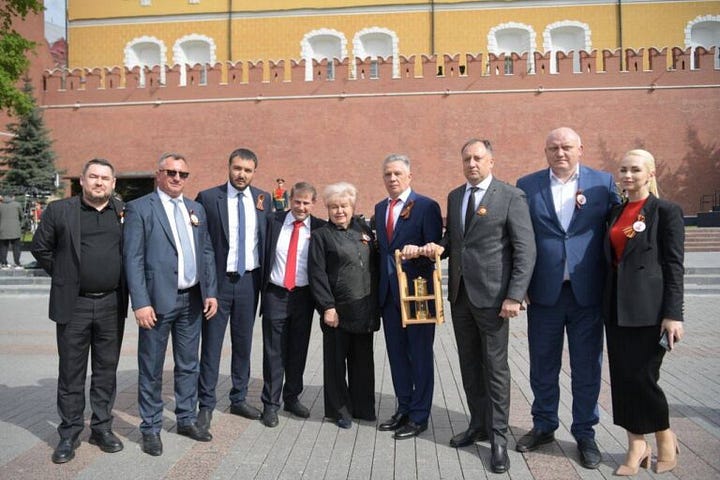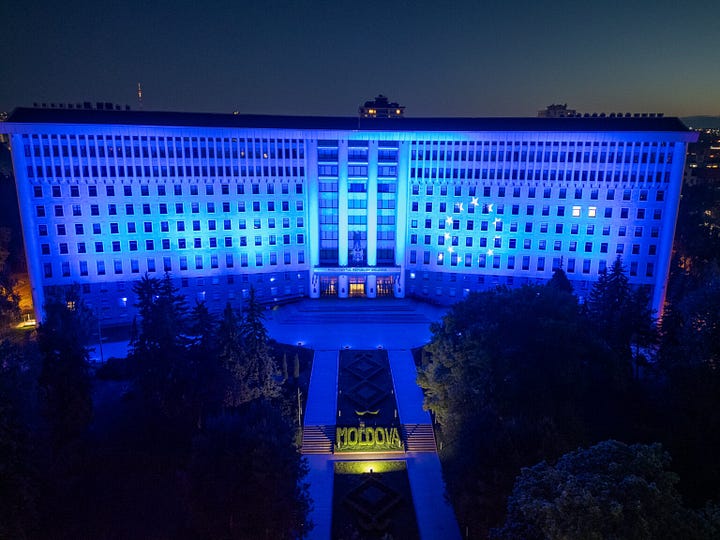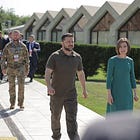Romania Votes Sunday
This week the biggest story in Moldova is unfolding in Romania as the country prepares to vote this Sunday in the second round of their presidential elections. Politico’s poll of polls indicates that the race is close with George Simion narrowly leading Nicușor Dan 49% to 46%. Some recent polls have even shown Dan pulling ahead of Simion - but with the important caveat that only Romanians living in Romania are reflected in any of these polls. Given Simion’s commanding lead in the first round with diaspora voters the conventional wisdom is that Dan continues to face an uphill battle. Of all the countries with substantial populations of Romanians outside Romania itself, only Moldova voted strongly for pro-EU candidates in the first round.
Also voting on Sunday is Poland, where voters will head to the polls in the first round of their presidential elections. George Simion skipped valuable campaign time to fly to Poland and appear alongside far-right Law and Justice presidential candidate Karol Nawrocki at an election rally there. Polish Prime Minister Donald Tusk commented on this saying:
"Nawrocki and his pro-Russian Romanian counterpart George Simion on the same stage five days before the presidential elections in Poland and Romania. Everything is clear,"
Nawrocki, like Simion, has worked hard in recent months to cultivate support from the Trump Administration and was photographed with President Trump in the Oval Office on May 2nd.
This weekend’s elections have Europe holding its breath as far-right “sovereigntist” candidates make their plays for power in 2 of the EU, and NATO’s, most critical countries.
President Maia Sandu made a video address calling Moldovan-Romanian dual citizens to the polls to vote for Nicușor Dan saying:
“We, Moldovans, know how much freedom and security are worth – and we want to be part of the European family, alongside Romania. And those of us who are also Romanian citizens can vote this weekend to protect what Romania has already won, but which is now threatened." …
"Good luck, Nicușor Dan! I admire your decency, your resistance, your respect for the truth. It's not easy in populist times, but it's all the more important to do what's right for Romania and for the Republic of Moldova,"
Pro-European turnout, or lack thereof, will likely be the deciding factor in this election. We’ll return next week to recap the results and look at what they mean for Moldova.
Europe Day and Victory Day
On May 9th Moldova commemorated the 80th anniversary of the end of the second world war and / or celebrated victory and / or celebrated Europe day. This polarizing date has become a focal point of the east vs west culture war that has defined much of Moldova’s history as an independent country.
For a brief history of these 2 holidays see this footnote1.
President Sandu, Prime Minister Recean and Speaker Grosu laid flowers at Chisinau’s WW2 memorial on the morning of May 9th. President Sandu spoke at the event saying:
"Today, we honor the memory of those who died in World War II to restore peace on our land. 56,000 Moldovans did not return home from the front, and almost every family lost a loved one. Moldovans of all nationalities - Romanians, Ukrainians, Bulgarians, Russians, Gagauz - fought and died in the name of restoring peace for the triumph of peace. Our duty is to preserve peace and honor their heroism and sacrifice with humility and respect," …
“Sometimes it seems that some do not understand why others cannot rejoice on May 9, celebrate with all their hearts, talk about triumph. I want to explain - this is not for the sake of division, but, on the contrary, for the sake of unity and reconciliation. In 1940, the implementation of the pact on the division of Europe began. This pact was signed by the foreign ministers of Nazi Germany and the Soviet Union, and for the people living on the territory of today's Republic of Moldova, regardless of their nationality, religion or political views, a very difficult period began. This is a time of pain and organized violence. […] In 1941, a real war came to our land, and this war swept through Moldova twice. In families all over Moldova, there are grandfathers and great-grandfathers buried from Stalingrad to Vienna and Berlin. None of them wanted to kill and none of them wanted to die, did not want to leave their home. Chisinau and many other cities were almost completely destroyed already in 1941, and then another black page began for our people, for our history - the Holocaust,” …
"Will we as a country be able to overcome unnecessary disputes? I very much hope so, and I believe with all my heart that the real fight is not for the past, but for the future. Every person in Moldova must act with the deepest responsibility to stop division and hatred, to stop our conflicts. Only together can we preserve peace at home,"
Marking the 80th anniversary of the end of the war on May 8th the foreign ministers of the Czech Republic, Estonia, Latvia, Lithuania, Poland, Ukraine and Moldova penned a joint op-ed for the New York Times calling on the world to heed the lessons of that last slide to world war. They call out the folly of appeasement, the dangers of spheres of influence, the manipulation of history and they end by quoting Ukrainian President Volodymyr Zelensky saying that “Freedom must be armed better than tyranny.”
In Chisinau, blue Europe-Day celebrations and concerts contrasted with red Victory Day marches. Marina Tauber, Vasile Bolea, Alexei Lunga and other top Thor politicians traveled to Moscow to celebrate victory alongside Ilan Shor in Red Square.
They were followed on May 12th by various Socialist MPs including Igor Dodon who attended meetings and roundtables dedicated to the 80th anniversary of victory2.




Moldova International Affairs
Here’s a roundup of the top international affairs stories of the week:
European Commissioner for Enlargement Marta Cos and Prime Minister Recean sign the “Moldova Development Plan” on Europe Day. This agreement formally ratifies the EU’s historic €1.9 billion euro investment package for Moldova. As part of his remarks the Prime Minister outlined how these investments will support the Moldovan economy and make it possible for Moldova to join the EU in 4 years. Marta Cos responded to this statement by offering the Prime Minister a wager - suggesting that Moldova could be admitted in as little as 3 years 10 months saying "Let's make a bet and see who wins."
President Sandu will attend the 6th European Political Community (EPC) Summit in Albania on May 16th. She will meet with European leaders at the event and also pay an official visit to Montenegro on May 19th following the EPC summit. Albania’s pro-EU government just won a new term in office “trouncing” a MAGA backed opponent whose campaign was being advised by former Trump campaign manager Chris LaCivita. Moldova previously hosted the 2nd EPC summit in June 2023 which we covered extensively in Moldova Matters:
Moldova and Belgium face a strange diplomatic scandal. Belgian Minister for Asylum, Migration and Social Integration Anneleen Van Bossuyt came to Chisinau with a strong message - do not apply for asylum in Belgium. Before even arriving in Chisinau she made a “direct” facebook post calling out what she referred to as “asylum tourism.” The minister claims that Moldovans, particularly ethnically Roma citizens, have been traveling to Belgium each winter since 2020 and spending months in migrant shelters while their applications for asylum are processed - and then rejected. She gave an interview to Newsmaker while in Moldova and pivoted nearly every question, including one about whether or not she was socially stigmatizing the Roma community, to a simple message - do not come to Belgium. Moldova’s Minister of Labor and Social Protection Alexei Buzu gave a statement to the press after his meeting with Van Bossuyt saying:
“We, as public figures, must be more conscious in the way we speak about certain categories of the population, because we want to avoid victimization and stigmatization of certain groups. And I try to adhere to this important rule. As I said at the meeting with the minister, we asked for additional clarification. We are a responsible country, with responsible citizens and government. If the problem really exists, we want to understand it,”
Economic Updates
Here are the top stories in economics and infrastructure of the week:
7 Moldovan banks joined the Single Euro Payments Area (SEPA) on Europe Day. This follows on Moldova’s admission to SEPA on March 6th. The National Bank of Moldova announced that by joining SEPA wire transfers fees for Moldovans will fall from current rates of between €20 - 200 euros down to €1-2 euros.
The National Bank (NBM) announced that inflation climbed to 8.8% in Q1. This is a 2.9% increase from Q4 2024. The NBM stated that the primary driver of inflation was increased energy prices and they project a downward trajectory starting in Q2 and falling to the 5% target range by the end of the year. At the same time NBM cautioned that the international outlook remains uncertain, citing downward revisions in global growth by the IMF and the “the actions of Donald Trump” which “raised trade barriers to the level of those in the 1930s.”
The Competition Council has approved the acquisition of supermarket chain Forchette by Moldretail Group SRL. Moldretail Group currently owns Linella as well as Fidesco and some smaller local brands. The Competition Council approved the acquisition contingent on the combined company selling 5 locations in Chisinau and committing to maintaining Forchette’s existing supplier relationships for 3 years.
This issue of Moldova Matters is supported by Rotary Club Cosmopolitan — Club Secretary Luc Vocks invites you to join an English-speaking (mostly) expat club that meets weekly to hear from engaging speakers and enjoy some light networking. If you're curious to learn more or would like to attend a meeting as a guest, feel free to contact l.vocks@developmentaid.org.
A Brief History…
At 23:01 on May 8th, 1945 Germany unconditionally surrendered to the allies. This is marked in most of Western Europe as VE-Day, or Victory in Europe Day, reflecting the fact that the war was still raging in the Pacific. The Soviet Union chose to mark the event on May 9th as the German surrender occurred on that day on Moscow time. This event was declared a national holiday in the Soviet Union in 1965. After a break during the 1990s Vladimir Putin brought back the holiday upon his rise to power and has made it the basis of a sort-of civic religion with mass military parades and ceremonies in cities and towns all across Russia.
Europe Day was introduced in 1964 to commemorate the 1950 Schuman Declaration which is seen as the first step towards forging the European Union. This declaration was itself timed for the day after the 5th anniversary of the end of the war.
Moldova has a complicated history with these holidays both due to the collision of dates due to time zones and Soviet legacy, as well as the events of the war itself. Society is split between those who follow the Russian celebration of victory over Nazi Germany and those who commemorate the horrors of the war while celebrating the European peace project that followed. Making this even more complicated is the fact that Moldova entered WW2 when it was invaded not by Nazi Germany but by the Soviet Union in 1940 as part of the Molotov–Ribbentrop Pact signed between the Nazis and the Soviets. A fact that led to first Soviet, then Nazi, then Soviet occupation.
The Socialists apparently did not receive invitations to the May 9th events in Moscow but were brought there later, potentially as a sort of consolation prize.



Good, clear explanation for a confusing matter when seen from different points of view. Thanks.